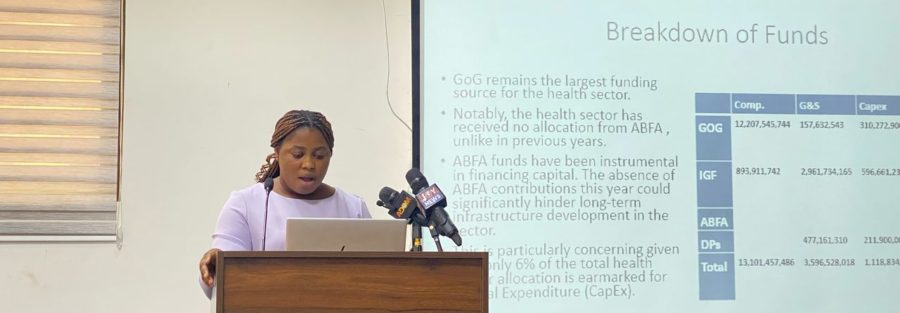ARHR has organized a meeting to disseminate findings of its analysis of Ghana’s 2025 Health Sector budget.
The meeting brought together key stakeholders from civil society and the media with vested interest in the health sector to review and discuss the implications of the latest budget allocations for health. The gathering served as a platform to share insights, highlight improvements, and critically examine areas of concern in the 2025 health budget.
The 2025 Health Sector Budget
Ghana’s 2025 budget shows the nation’s effort to strengthen its healthcare system, indicating commendable progress in health financing amid a challenging economic landscape. The government has demonstrated a renewed commitment to expanding access to essential health services and improving overall health outcomes, with increased allocations to the health sector. However, while these advancements signal a positive trajectory, persistent structural concerns—ranging from inefficiencies in resource distribution to gaps in health workforce capacity—pose significant challenges to long-term sustainability.
Key Government Efforts and Existing Challenges
Ghana’s 2025 health budget has seen a 13.4% nominal increase in allocation compared to the previous year. A notable policy shift in the budget is the uncapping of the National Health Insurance Levy (NHIL), ensuring full allocation of funds to the National Health Insurance Scheme (NHIS) to fortify healthcare and improve access.
The Ministry of Health has a GH₵17.82 billion allocation, a GH₵2.1 billion increase from the 2024 allocation. This represents 6.32% of the national budget, surpassing the World Health Organization (WHO) recommendation but still falling short of the Abuja Declaration target of 15%.
Despite this increase, concerns persist regarding the distribution of funds within the health sector. Compensation for health workers accounts for 74% of the budget, leaving only 6% for Capital Expenditure (CAPEX), which constrains investment in crucial health infrastructure. The absence of the Annual Budget Funding Amount (ABFA) contributions further aggravates infrastructure challenges, particularly affecting the completion of the Agenda 111 project.
Mental health also remains underfunded, with no significant provisions for expanding services beyond Ghana’s three major mental health facilities. Additionally, while the government has allocated GH₵292.4 million for the Free Sanitary Pad Policy to support menstrual hygiene among female students, the policy lacks a detailed implementation and funding strategy.
Although NHIS funding is projected to increase to GH₵9.93 billion, past budget trends indicate inconsistencies in fund disbursement, which negatively impact service delivery. While the uncapping of NHIL is a commendable step, existing NHIS arrears and outstanding debts remain a critical concern. Combined with the freeze on health sector employment and the growing burden of non-communicable diseases (NCDs), these challenges raise concerns about the efficiency of Ghana’s healthcare system.
Policy Recommendations
Participants at the meeting reiterated ARHR’s proposal to the government to improve the health sector’s effectiveness as follows:
- Increased and Equitable Health Financing: The government should progressively increase the health budget and meet the Abuja Declaration target of 15%. More funds should be allocated to CapEx to address infrastructure deficits.
- Clear Implementation Plan for Free Sanitary Pad Policy: A transparent implementation strategy should outline the frequency of distribution, targeted beneficiaries, funding sources, and procurement arrangements to ensure program sustainability.
- Address NHIS Arrears and Ensure Timely Disbursement: A clear roadmap should be developed to settle NHIS arrears and ensure the timely allocation of funds to improve healthcare service delivery.
- Infrastructure Investment and Agenda 111 Commitment: A dedicated funding mechanism should be established to complete Agenda 111 projects and improve healthcare access, especially in underserved areas.
- Prioritizing Existing Projects: Instead of initiating new projects, the government should focus on completing existing health facilities to avoid wasted investments and increase healthcare accessibility.
- Engagement of the Private Sector in Health Infrastructure Development: Public-Private Partnerships (PPPs) should be explored to accelerate the completion of Agenda 111 and other health projects.
- Employment of Healthcare Professionals: The government should reconsider the recruitment freeze in the health sector to address staffing shortages and improve service delivery.
- Expansion of Mental Health Services: Budgetary allocations should be increased to expand mental health facilities beyond the three major centers and ensure wider accessibility.
- Strengthening Health System Resilience Against NCDs: The NHIS should prioritize funding for the management and treatment of NCDs, ensuring early detection and adequate medical supplies.
Conclusion
Looking ahead, participants strongly encouraged the government to adopt the outlined recommendations to improve healthcare accessibility, ensure long-term sustainability, and build a more resilient health system in Ghana. The meeting served as a vital platform for fostering inclusive dialogue, ultimately shaping informed policy decisions. By promoting transparency and championing evidence-based strategies, the discussions significantly contributed to strengthening health financing mechanisms and advancing the quality and reach of health service delivery nationwide.



